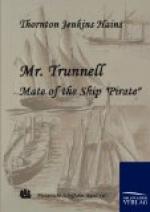“‘Was it Mrs. Jameson ye wished to see?’ he asked.
“The old woman nodded.
“‘Well—er—faith, an’ she—er,’ an’ thin he stopped to look at Garnett.
“’She had an accident, by yer lave, ’bout a month ago. How was it ye niver hearn tell? Waren’t ye here whin th’ old man brought her ashore?’
“’I come from ‘Frisco,’ says she.
“‘Well, I s’pose ye might as well know now as niver,’ O’Toole blurted out; ‘she’s dead, owld woman. Been dead a month gone. Th’ old man buried her dacent like, fer, as ye say, she ware a rale good gal, ’pon me whurd, fer a fact, she ware that. ‘Tis hard to tell ye, but it’s th’ truth, th’ whole truth, an’ divil a bit besides.’
“While he talked th’ old woman’s head went lower, and whin he finished, she gave a hard gasp. Thin she stood huddled forninst th’ deck-house, an’ Garnett started forward to th’ men at work stevin’ th’ last av th’ cargo.
“All av a sudden like I saw her raise her face an’ spit a button from her mouth. Her eyes ware starin’ an’ lookin’ at th’ hill away off t’ th’ eastward av th’ town an’ beyant to th’ great southern mountings av th’ Andes range. Thin she slowly straightened up an’ walked wid a firm step along th’ deck an’ th’ gang-plank.
“Th’ soldier men made way for her on th’ dock, but she looked straight beyant her nose an’ held her way firm an’ strong until she went out av sight, lavin’ O’Toole starin’ after her.
“‘’Pon me whurd, Garnett,’ he called, ’’tis a most wonderful thing, look!’
“’’Tis a mother’s love, ye haythen; ‘pon me whurd, there’s nothin’ else like it. See how th’ news affected th’ poor old crayther. It puts me in mind av the time whin I had an old leddy t’ look after me. ’Tis a rale jewil av a thing, an’ a man only has it th’ onct.’
“‘More’s th’ pity,’ says Garnett. ’Sink ye, but ye sure are a tough one to tell th’ old gal on so short notice. But ye niver did have no feelin’s, ye bloomin’ heathen.’
“‘’Pon me sowl, what cud I do else?’
“‘O’ course, ’tain’t likely a rough feller like you could do any better, but whin any wimmen folks come aboard agin, come to a man as is used to thim. A man as can talk an’ act in a way they likes. A man wid some ways to him. A man—’ Here he stooped an’ picked up th’ button th’ old gal had dropped.
“‘Where did this come from?’ he asked.
“‘She had it in her mouth,’ says O’Toole.
“‘Well, it’s one av th’ buttons off a uniform that ain’t healthy to be wearin’ around these parts just now.’ An’ then they both looked hard at th’ little thing.
“‘D’ye s’pose it cud have been?’ asked O’Toole.
“‘Been what?’ says Garnett.
“‘Jameson, ye blatherin’ ijiot. Jameson, th’ same as left his wife, a-comin’ here huntin’ for her. ’Twas so, fer a fact. He had it in his mouth to kape us from knowin’ his voice, an’ by th’ same tokin, I calls to mind th’ chokin’ in his throat, the scand’lous owld woman he was.’




